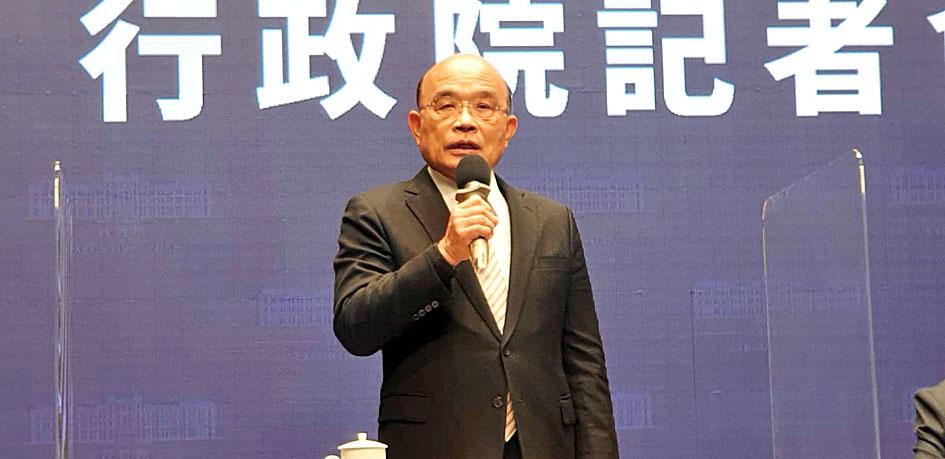The Executive Yuan yesterday approved amendments to toughen sanctions against economic spies working for China or other foreign nations.
Premier Su Tseng-chang (蘇貞昌) told a Cabinet meeting that China in the past few years has intensified its “red supply chain” infiltration of industries in Taiwan.
Chinese firms are attracting high-tech talent from Taiwan and stealing “core” technologies, Su said.

Photo: Lee Hsin-fang, Taipei Times
As a result, it is necessary to establish stricter regulations and a more robust national security policy to protect such technologies, he said.
The proposed amendments to the National Security Act (國家安全法) stipulate that anyone who steals Taiwan’s core technologies or trade secrets to give them to China or other hostile foreign forces would face five to 12 years in prison, and be fined NT$50 million to NT$100 million (US$1.79 million to US$3.59 million).
Those who give their own trade secrets of Taiwan’s core technologies to China, including Hong Kong and Macau, or other foreign jurisdictions would face up to 10 years in prison and a fine of up to NT$50 million, the proposed amendments say.
Draft amendments to the Act Governing Relations Between the People of the Taiwan Area and the Mainland Area (兩岸人民關係條例) say that individuals or members of organizations that receive government subsidies for work on national core technologies must report to the government and secure approval if they want to travel to China less than three years after working on government-sponsored projects.
Such people who travel to China without securing prior approval would face a fine of up to NT$10 million, the draft amendments say.
The proposed changes to the National Security Act are necessary, as they offer two more layers of protection to prevent Taiwan’s core technologies from being illegally obtained by foreign hostile forces, complimenting protections in the Trade Secrets Act (營業秘密法), the Ministry of Justice said.
The Intellectual Property and Commercial Court and the Taiwan High Court are to have jurisdiction over cases of economic spying and extraterritorial use of core technologies, the ministry said.
Department of Prosecutorial Affairs Director-General Lin Jinn-tsun (林錦村) said that core technologies are those that are regulated by the government to uphold national defense and the safety of key infrastructure.
They also include leading technologies that have the potential to greatly elevate Taiwan’s global competitiveness, Lin said.
A list of core technologies is to be announced by the Executive Yuan, he said.
The proposed amendments need to be approved by the Legislative Yuan and promulgated by President Tsai Ing-wen (蔡英文) before they take effect.

MAKING WAVES: China’s maritime militia could become a nontraditional threat in war, clogging up shipping lanes to prevent US or Japanese intervention, a report said About 1,900 Chinese ships flying flags of convenience and fishing vessels that participated in China’s military exercises around Taiwan last month and in January last year have been listed for monitoring, Coast Guard Administration (CGA) Deputy Director-General Hsieh Ching-chin (謝慶欽) said yesterday. Following amendments to the Commercial Port Act (商港法) and the Law of Ships (船舶法) last month, the CGA can designate possible berthing areas or deny ports of call for vessels suspected of loitering around areas where undersea cables can be accessed, Oceans Affairs Council Minister Kuan Bi-ling (管碧玲) said. The list of suspected ships, originally 300, had risen to about

DAREDEVIL: Honnold said it had always been a dream of his to climb Taipei 101, while a Netflix producer said the skyscraper was ‘a real icon of this country’ US climber Alex Honnold yesterday took on Taiwan’s tallest building, becoming the first person to scale Taipei 101 without a rope, harness or safety net. Hundreds of spectators gathered at the base of the 101-story skyscraper to watch Honnold, 40, embark on his daredevil feat, which was also broadcast live on Netflix. Dressed in a red T-shirt and yellow custom-made climbing shoes, Honnold swiftly moved up the southeast face of the glass and steel building. At one point, he stepped onto a platform midway up to wave down at fans and onlookers who were taking photos. People watching from inside

Japan’s strategic alliance with the US would collapse if Tokyo were to turn away from a conflict in Taiwan, Japanese Prime Minister Sanae Takaichi said yesterday, but distanced herself from previous comments that suggested a possible military response in such an event. Takaichi expressed her latest views on a nationally broadcast TV program late on Monday, where an opposition party leader criticized her for igniting tensions with China with the earlier remarks. Ties between Japan and China have sunk to the worst level in years after Takaichi said in November that a hypothetical Chinese attack on Taiwan could bring about a Japanese

STREAMLINED: The dedicated funding would allow the US to transfer equipment to Taiwan when needed and order upgraded replacements for stockpiles, a source said The US House of Representatives on Thursday passed a defense appropriations bill totaling US$838.7 billion, of which US$1 billion is to be allocated to reinforcing security cooperation with Taiwan and US$150 million to replace defense articles provided to the nation. These are part of the Consolidated Appropriation Act, which the US House yesterday passed with 341 votes in favor and 88 against. The act must be passed by the US Senate before Friday next week to avoid another government shutdown. The US House Committee on Appropriations on Monday unveiled the act, saying that it allocates US$1 billion for the Taiwan Security Cooperation Initiative